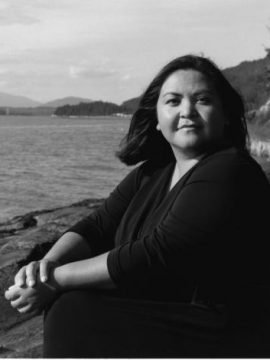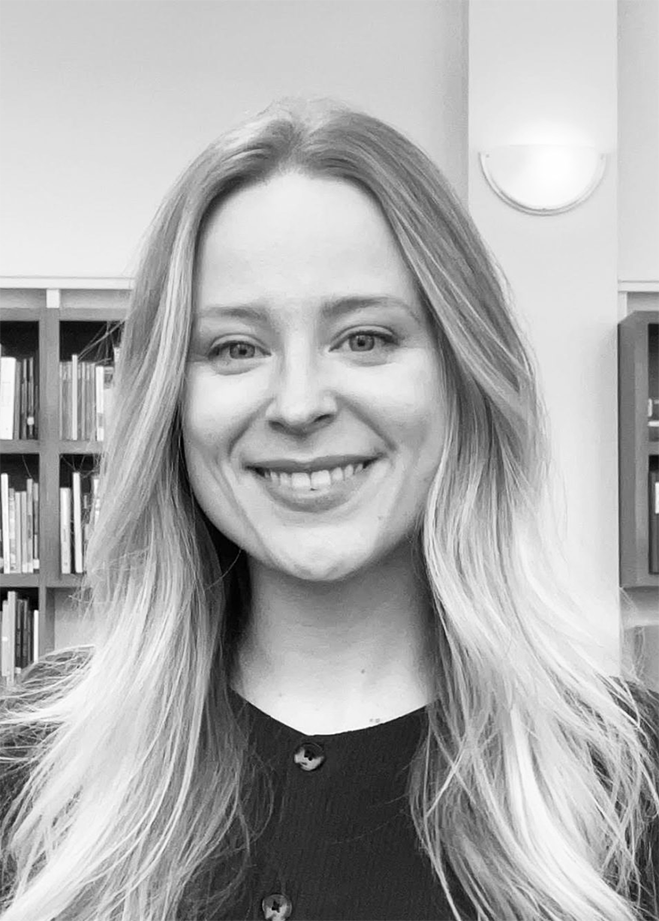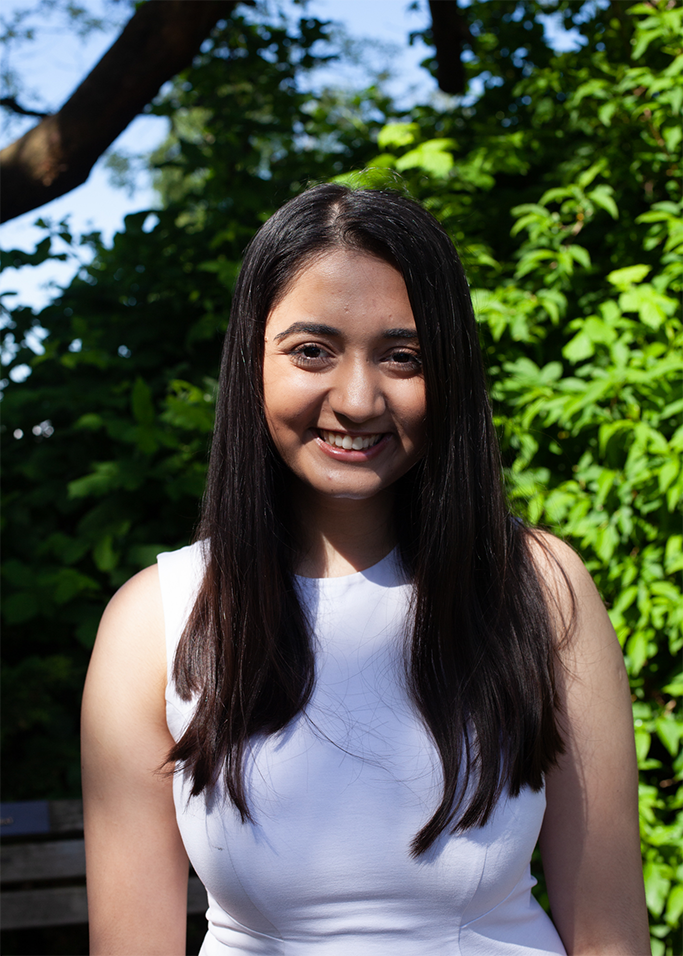Eden Robinson

Eden Robinson, an internationally acclaimed Haisla and Heiltsuk novelist and short story writer, is the recipient of a 2018 honorary doctoral degree from UBC for her literary contributions. A graduate of UBC’s master’s program in Creative Writing, she has received numerous awards, including the 2016 Writers’ Trust Engel/Findley Award. Her most recent novel, Son of a Trickster, was shortlisted for the 2017 Scotiabank Giller Prize.
When did you decide you wanted to be a writer? What challenges did you face in launching your writing career?
Grade 11. My biggest challenge was my own insecurity. It took a long time to believe I had anything to say.
What do you enjoy most about being a writer, and what do you find challenging?
I like setting my own hours. I like the flexibility of the writing life–I don’t need to take time off to go to the dentist or doctor. That said, whatever I’m working on is always on in the background. I’m obsessed with it and have a hard time grounding myself in the present. It’s challenging to maintain relationships with non-writers because the urge to write can be overwhelming and inexplicable. Yes, yes, I know I said I wanted to go to that movie and we bought tickets, but I just realized how to show my narrator’s blindspot to the reader without the narrator realizing it! Must write! Now!
What did you enjoy most about being in the UBC Creative writing program?
Mostly I enjoyed the company of people focused on the same goal as me. I found it inspiring, even as I found the learning curve daunting. I was fortunate enough to have mentors that guided me and nurtured me. I realize others have not had the same experience and I’m grateful there are so many unsung heroes fighting to put safeguards up around our emerging writers.
What does receiving an honorary doctoral degree mean to you?
The honorary degree was a delightful surprise. Thank you, to the person who nominated me and to the jury who selected me. It means the world to me to be recognized for my literary contributions.
Can you tell us about your latest novel – Son of a Trickster – and what inspired the story?
Son of a Trickster is a coming of age story set in a northern, company town with shape-shifting Tricksters and pot cookies. Two things inspired me–first, my dad telling a Wee’git story to his grandkids and them not getting the humour. Wee’git the transforming raven is our Trickster. It made me sad to realize they didn’t have the context that I’d grown up with. Second, an author named Richard Van Camp once told a story about otter women at the All-Native Basketball tournament in Rupert, and it gave me so much pleasure to see a familiar story set in the modern day.
Can you tell us about your writing process and daily routine? Are there any habits you have established that have helped you as a writer?
I wrote Son of a Trickster between 4 am and 5 am every morning for a year. I had a lot of pressing personal and professional obligations that meant I could get up very early or not write. Things were more relaxed for the second book in the series, Trickster Drift, which I wrote between 7am and 8 am every day for a year. I’d add bits and pieces and edit throughout the day, but my main writing time was always that hour. I’ve been struggling with the third novel in the series, The Return of the Trickster, and I think it’s because I’ve been trying to write between 10 am and 11 am. It’s just too late in the day for my muse. I used to be a night writer, so mornings are coffee-fueled to the point I’m thinking of getting an espresso machine.
What advice would you give to aspiring writers?
If you’re beating yourself up for not getting everything right in your first manuscripts, learn to be gentle. Your creative energy is sacred. I’ve seen a lot of promising writers stomp their creative seedlings because they weren’t giant cedars the second they pushed out of the ground.
What’s next for you?
After the Trickster series is finished, I’m going back to a manuscript tentatively titled Trashy, Band Council Romance.
Related:
- Nineteen Questions with Eden Robinson (interviewed by Stephanie Chou)
Eden Robinson



Eden Robinson, an internationally acclaimed Haisla and Heiltsuk novelist and short story writer, is the recipient of a 2018 honorary doctoral degree from UBC for her literary contributions. A graduate of UBC’s master’s program in Creative Writing, she has received numerous awards, including the 2016 Writers’ Trust Engel/Findley Award. Her most recent novel, Son of a Trickster, was shortlisted for the 2017 Scotiabank Giller Prize.
When did you decide you wanted to be a writer? What challenges did you face in launching your writing career?
Grade 11. My biggest challenge was my own insecurity. It took a long time to believe I had anything to say.
What do you enjoy most about being a writer, and what do you find challenging?
I like setting my own hours. I like the flexibility of the writing life–I don’t need to take time off to go to the dentist or doctor. That said, whatever I’m working on is always on in the background. I’m obsessed with it and have a hard time grounding myself in the present. It’s challenging to maintain relationships with non-writers because the urge to write can be overwhelming and inexplicable. Yes, yes, I know I said I wanted to go to that movie and we bought tickets, but I just realized how to show my narrator’s blindspot to the reader without the narrator realizing it! Must write! Now!
What did you enjoy most about being in the UBC Creative writing program?
Mostly I enjoyed the company of people focused on the same goal as me. I found it inspiring, even as I found the learning curve daunting. I was fortunate enough to have mentors that guided me and nurtured me. I realize others have not had the same experience and I’m grateful there are so many unsung heroes fighting to put safeguards up around our emerging writers.
What does receiving an honorary doctoral degree mean to you?
The honorary degree was a delightful surprise. Thank you, to the person who nominated me and to the jury who selected me. It means the world to me to be recognized for my literary contributions.
Can you tell us about your latest novel – Son of a Trickster – and what inspired the story?
Son of a Trickster is a coming of age story set in a northern, company town with shape-shifting Tricksters and pot cookies. Two things inspired me–first, my dad telling a Wee’git story to his grandkids and them not getting the humour. Wee’git the transforming raven is our Trickster. It made me sad to realize they didn’t have the context that I’d grown up with. Second, an author named Richard Van Camp once told a story about otter women at the All-Native Basketball tournament in Rupert, and it gave me so much pleasure to see a familiar story set in the modern day.
Can you tell us about your writing process and daily routine? Are there any habits you have established that have helped you as a writer?
I wrote Son of a Trickster between 4 am and 5 am every morning for a year. I had a lot of pressing personal and professional obligations that meant I could get up very early or not write. Things were more relaxed for the second book in the series, Trickster Drift, which I wrote between 7am and 8 am every day for a year. I’d add bits and pieces and edit throughout the day, but my main writing time was always that hour. I’ve been struggling with the third novel in the series, The Return of the Trickster, and I think it’s because I’ve been trying to write between 10 am and 11 am. It’s just too late in the day for my muse. I used to be a night writer, so mornings are coffee-fueled to the point I’m thinking of getting an espresso machine.
What advice would you give to aspiring writers?
If you’re beating yourself up for not getting everything right in your first manuscripts, learn to be gentle. Your creative energy is sacred. I’ve seen a lot of promising writers stomp their creative seedlings because they weren’t giant cedars the second they pushed out of the ground.
What’s next for you?
After the Trickster series is finished, I’m going back to a manuscript tentatively titled Trashy, Band Council Romance.
Related:
- Nineteen Questions with Eden Robinson (interviewed by Stephanie Chou)



